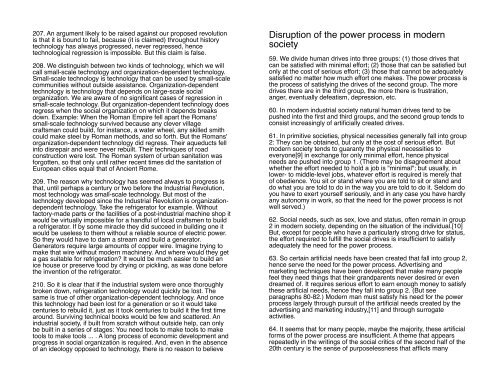Unabomber Manifesto - ouroboros ponderosa
Unabomber Manifesto - ouroboros ponderosa
Unabomber Manifesto - ouroboros ponderosa
Create successful ePaper yourself
Turn your PDF publications into a flip-book with our unique Google optimized e-Paper software.
207. An argument likely to be raised against our proposed revolutionis that it is bound to fail, because (it is claimed) throughout historytechnology has always progressed, never regressed, hencetechnological regression is impossible. But this claim is false.208. We distinguish between two kinds of technology, which we willcall small-scale technology and organization-dependent technology.Small-scale technology is technology that can be used by small-scalecommunities without outside assistance. Organization-dependenttechnology is technology that depends on large-scale socialorganization. We are aware of no significant cases of regression insmall-scale technology. But organization-dependent technology doesregress when the social organization on which it depends breaksdown. Example: When the Roman Empire fell apart the Romans'small-scale technology survived because any clever villagecraftsman could build, for instance, a water wheel, any skilled smithcould make steel by Roman methods, and so forth. But the Romans'organization-dependent technology did regress. Their aqueducts fellinto disrepair and were never rebuilt. Their techniques of roadconstruction were lost. The Roman system of urban sanitation wasforgotten, so that only until rather recent times did the sanitation ofEuropean cities equal that of Ancient Rome.209. The reason why technology has seemed always to progress isthat, until perhaps a century or two before the Industrial Revolution,most technology was small-scale technology. But most of thetechnology developed since the Industrial Revolution is organizationdependenttechnology. Take the refrigerator for example. Withoutfactory-made parts or the facilities of a post-industrial machine shop itwould be virtually impossible for a handful of local craftsmen to builda refrigerator. If by some miracle they did succeed in building one itwould be useless to them without a reliable source of electric power.So they would have to dam a stream and build a generator.Generators require large amounts of copper wire. Imagine trying tomake that wire without modern machinery. And where would they geta gas suitable for refrigeration? It would be much easier to build anice house or preserve food by drying or pickling, as was done beforethe invention of the refrigerator.210. So it is clear that if the industrial system were once thoroughlybroken down, refrigeration technology would quickly be lost. Thesame is true of other organization-dependent technology. And oncethis technology had been lost for a generation or so it would takecenturies to rebuild it, just as it took centuries to build it the first timearound. Surviving technical books would be few and scattered. Anindustrial society, if built from scratch without outside help, can onlybe built in a series of stages: You need tools to make tools to maketools to make tools ... . A long process of economic development andprogress in social organization is required. And, even in the absenceof an ideology opposed to technology, there is no reason to believeDisruption of the power process in modernsociety59. We divide human drives into three groups: (1) those drives thatcan be satisfied with minimal effort; (2) those that can be satisfied butonly at the cost of serious effort; (3) those that cannot be adequatelysatisfied no matter how much effort one makes. The power process isthe process of satisfying the drives of the second group. The moredrives there are in the third group, the more there is frustration,anger, eventually defeatism, depression, etc.60. In modern industrial society natural human drives tend to bepushed into the first and third groups, and the second group tends toconsist increasingly of artificially created drives.61. In primitive societies, physical necessities generally fall into group2: They can be obtained, but only at the cost of serious effort. Butmodern society tends to guaranty the physical necessities toeveryone[9] in exchange for only minimal effort, hence physicalneeds are pushed into group 1. (There may be disagreement aboutwhether the effort needed to hold a job is "minimal"; but usually, inlower- to middle-level jobs, whatever effort is required is merely thatof obedience. You sit or stand where you are told to sit or stand anddo what you are told to do in the way you are told to do it. Seldom doyou have to exert yourself seriously, and in any case you have hardlyany autonomy in work, so that the need for the power process is notwell served.)62. Social needs, such as sex, love and status, often remain in group2 in modern society, depending on the situation of the individual.[10]But, except for people who have a particularly strong drive for status,the effort required to fulfill the social drives is insufficient to satisfyadequately the need for the power process.63. So certain artificial needs have been created that fall into group 2,hence serve the need for the power process. Advertising andmarketing techniques have been developed that make many peoplefeel they need things that their grandparents never desired or evendreamed of. It requires serious effort to earn enough money to satisfythese artificial needs, hence they fall into group 2. (But seeparagraphs 80-82.) Modern man must satisfy his need for the powerprocess largely through pursuit of the artificial needs created by theadvertising and marketing industry,[11] and through surrogateactivities.64. It seems that for many people, maybe the majority, these artificialforms of the power process are insufficient. A theme that appearsrepeatedly in the writings of the social critics of the second half of the20th century is the sense of purposelessness that afflicts many






